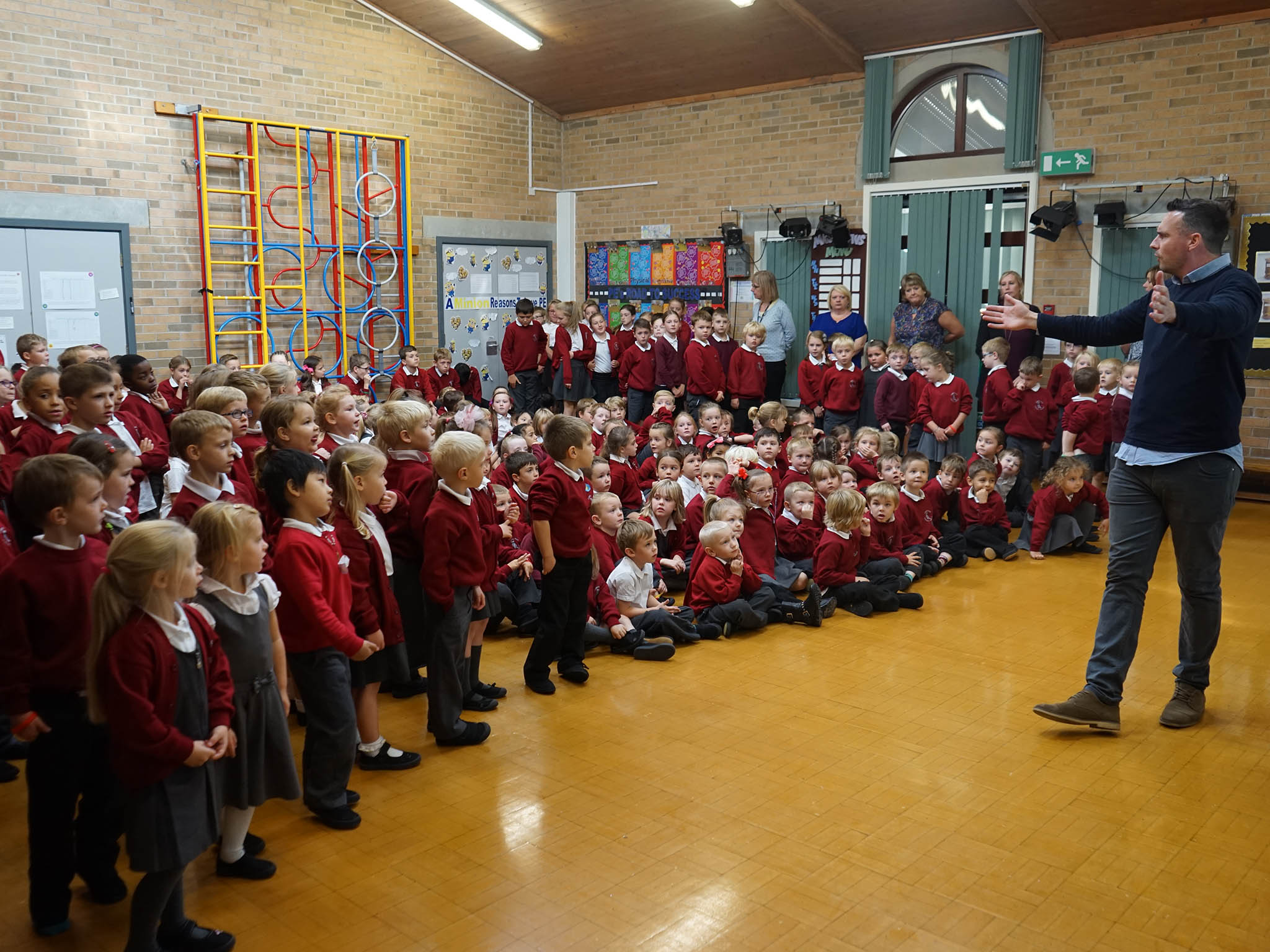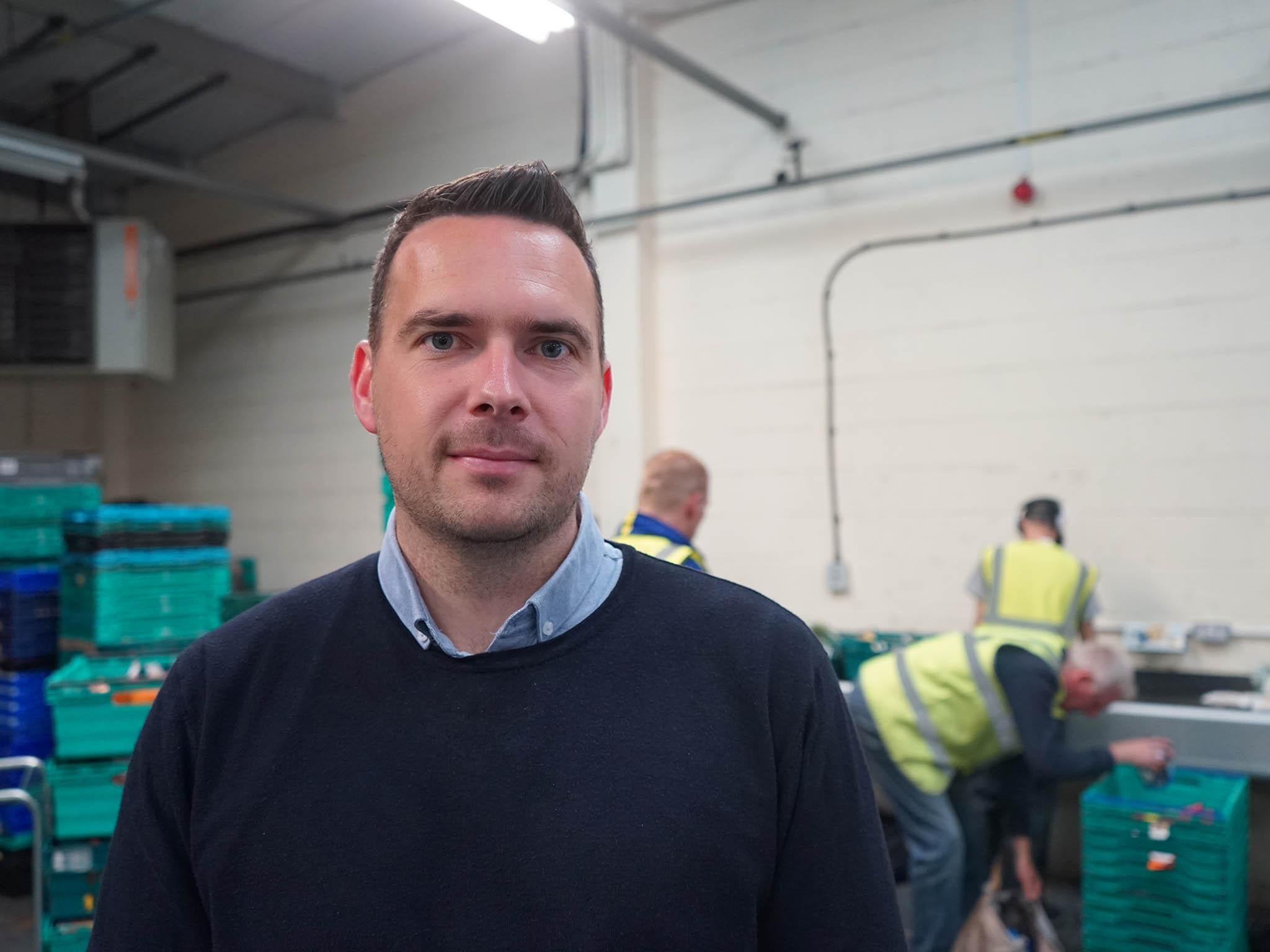Hungry children fed by The Real Junk Food Project in UK food waste initiative
Former primary school teacher Kevin Mackay aims to eliminate food waste, but not by the usual means. Armed with Fred the fox, he's educating young children on how to combat food waste in the home
Kevin Mackay is standing in front of hundreds of pairs of eyes at Lawns Park primary school in Leeds, all trained on a bright orange stuffed fox called Fred. “So Fred, which of these foods did supermarkets throw away?” He gestures to the giant pictures projected onto the back of the school hall: a cucumber, a tub of hot chocolate, a bunch of bananas. At each item, Fred raises his hand and the children’s eyes grow a bit wider. “That’s right, all these foods were thrown away by supermarkets,” Kevin says. Then he asks the children: “What could be done with this food instead?”
A boy in year five pipes up: “Feed the people in the world who don’t have enough.”
Kevin nods and explains: the cucumber was thrown away because it was in a box of 40, but one went mouldy. The tub of hot chocolate had a special barcode for a supermarket promotion, but went in the bin after the promotion ended because that was cheaper than changing all the barcodes. The banana was too straight, or too small, or too brown to convene with supermarket standards or EU regulations, so it joined the others on the scrapheap.
The children make faces and start murmuring to one another. They don’t need to be taught that this kind of waste is unacceptable, especially not in Leeds, where the number of people relying on food parcels rose 25 per cent between April 2014 and April 2015. Half of those receiving parcels were children.
But it’s not good enough that these children have an innate sense of the injustice of food poverty in the most wasteful country in Europe. Kevin’s on a mission to give them the tools to combat waste at home and in their own neighbourhoods. “Our end game is to stop food waste and the best way to do that is through grass roots education,” he says.

Kevin is the first full time member of staff at Fuel For School, the educational arm of food charity The Real Junk Food Project. He was recruited by an old school friend, Adam Smith, who founded the project in 2013. Together with an army of volunteers, they want to eliminate food waste by intercepting food discarded by supermarkets and other businesses and redistributing it to cafes, schools and their own “anti-supermarket” where people can pay as they feel, in money, resources or time, for food.
Fuel For School, the project’s educational initiative, is quite new. It’s been just four weeks since Kevin quit his role as a primary school teacher and got on the road with the giant stuffed fox, and he already knows food waste is far more than just an environmental issue. When he started the programme in his own class at Asquith Primary a few months earlier, five children who never had breakfast started eating before class in the morning. Their behaviour and concentration improved. Fuel for School has big plans to get breakfast to every single hungry schoolchild in the country. Why shouldn’t these kids eat, when 10 million tonnes of food get wasted in the UK every year?
First, they need the staff.
“We have the food but we don’t have the resources to get it to schools every day,” Kevin says. “That was probably the most difficult decision that we had to take, that it would be one delivery to each school each week, because we do have families who could use this food every single day.”
Volunteers are needed to go and collect food discarded or donated by supermarkets, sort it and get it out for people to eat before it goes off. Eager to be seen to be tackling their own waste, supermarkets frequently tout “zero waste to landfill” policies in PR exercises. But when they fail to sell produce, they divert it to anaerobic digestion plants that turn it into energy, or dump it on food charities burdened with more edible food than they can process on tiny budgets. In the two days before Kevin visits Lawns Park, the project will intercept a record 75 tonnes of waste, the equivalent of 37,500 meals. Panniers of jars and tins are stacked high in the warehouse, making a mockery of the value of food in a city where people still can’t afford to eat.
But households, not supermarkets, are responsible for over half of all food waste in the UK, which makes the education side of Fuel For School crucial.

Lawns Park is the 33rd primary school to join Fuel for School’s roster, which means they’ll get eight crates of food waste from the Real Junk Food Project warehouse every week to use in lessons and breakfast clubs. The rest goes on a market stall at the school gates, where parents can take as much as they like in exchange for donations of time, money and resources. They also get two workshops a year and an education pack that Kevin is putting together to teach children the value of food so that they can tackle waste in their own homes.
On the way to Lawns Park, Kevin talks more about the impact Fuel for School had on his former primary, Asquith. The project was started by Nathan Atkinson, the headteacher at nearby primary Richmond Hill, who used waste food to feed kids whose hunger was a barrier to learning.
Kevin says when he brought the project to his own school, he realised that it wasn’t just about hunger. “It was about the kids’ relationships with food. We got them running the market stall and suddenly we saw those difficult kids were engaged in the project, their handwriting improved, their maths improved.”
Cath Brook, a teaching assistant at Lawns Park, has run a cooking club for seven years to try and give kids skills that they often don’t learn from their parents. She also kept a market stall with food from the Real Junk Food Project running all summer. She remembers offering one parent a bag of rice and them saying, “I wouldn’t know what to do with that”.
She emerges from the front of the school to greet Kevin. “We’re into the second generation of de-skilled parents in the kitchen,” she says. “Since microwave meals came in, parents have been turning to fresh veg less and less and relying on prepackaged foods. I think it’s important that these children know what they’re eating, where it’s come from and how it’s prepared. That they develop an engagement with food and life skills for the future.”
The school sits between Old Farnley, a poorer neighbourhood, and New Farnley, a posher bit of four-bedroom homes. It must cater to both types of families. A third of children in the area are among the bottom 10 per cent for income in the whole country. “We have asked them to go to breakfast club,” says Rebecca Ford, the head teacher. “I know kids who come to school and their breakfast would be a chocolate biscuit or a packet of M&Ms. Sometimes they haven’t had breakfast at all. They would be tired, agitated, not ready for learning.”
Breakfast club is not only a chance for these children to eat, but a chance for them to sit and talk to one another in a calm environment. “They’re sitting together, chatting and having a lovely breakfast so that they’re ready for the day,” Rebecca says.

After the assembly, Kevin runs a workshop. The children discuss where food comes from, how much energy it takes to produce it and how far it travels before it reaches their plates. Later on, they dig through crates from the Pudsey warehouse and start to examine the food, smelling it, touching it and nibbling bits to see whether it is still good enough to eat. A little girl runs up to a supervisor with a bag of semolina. “Where is Polska?” she says. Learning that the word is Polish for Poland, she opens an atlas and traces the food’s journey from Poland to England on the map.
“This is a way for my children to be aware of the waste that’s created and to be proactive, to make our children see that they can do something about these things,” Rebecca, the head, says.
At the end of the day, the children arrange the food on a market stall at the school gates for parents. Fresh fruit and vegetables go first. Some children take biscuits to eat on the way home. The bread is inspected several times but left behind for being a little stale. Some parents swerve the stall altogether, perhaps as a point of pride. “That’s one reason why we try to make it about environmentalism rather than food poverty,” Kevin explains. “To stop any stigma.”
This week he will finish writing an education pack to distribute to schools so that they can lead Fuel For School themselves. He’ll meet with the education department at Leeds Beckett University to see if they can get student teachers involved. Adam is spending half his time in Sheffield to kickstart The Real Junk Food Project there and there are already discussions happening in Bradford and Wigan.
“That’s nothing,” Adam says at the suggestion that the project it catching on fast. “I'm hoping for all 236 schools in Leeds by the end of next summer.” In the long term, The Real Junk Food Project wants to be so successful at eliminating food waste that the school visits, the supermarket and the cafes are no longer needed. “We want to put ourselves out of business,” Adam says.
Join our commenting forum
Join thought-provoking conversations, follow other Independent readers and see their replies
Comments
Bookmark popover
Removed from bookmarks